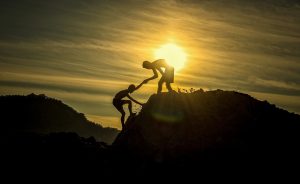
It’s no secret that there are a lot of people struggling economically in the U.S. Over the past year, the pandemic has made the need for help even more evident—for all the people now out of work and without savings to fall back on. It makes sense that people would turn to people in their lives for help—yet many won’t, even as they suffer.
After decades of erosion in government assistance for people who are struggling, the events of the last year make the need for a renewed, strengthened public safety net even more evident. Current proposals to expand rental and food assistance, the Earned Income Tax Credit, unemployment benefits, and other aid would all make an enormous difference for people who are suffering.
My book Surviving Poverty: Creating Sustainable Ties among the Poor describes a private safety net of social ties—people we know who we can rely on—that catches some people in the absence of adequate public assistance. This is simultaneously sad, even heart wrenching, because people can be in dire circumstances, lacking the fundamentals of food and shelter, and beautiful and joyous as others reach out a hand to help and let those struggling know they’re not alone. But a lot of people do not have a private safety net—and even those who do still often struggle to meet basic needs, a problem compounded by reluctance to ask for help.
In our research published last year using data from the Time, Love, and Cash in Couples with Children Study[1] (TLC3, connected to the Fragile Families & Child Wellbeing Study), Laryssa Mykyta and I found that some people will resist help from others, even when they’re really struggling, and especially if they have to ask.
Some families do not need to be asked. In an interview, Wendy[2] said she never asks her family for help. “I never pay them back, they never say anything. They’re always right there to help. We try to pay them back; they never accept it,” she said.
Other participants also reported getting help from family members and feeling really good about it, but a common theme was that the help was freely given. None of the participants who reported feeling so positive about the help they received from family members had to ask for help. Asking for help is far different from receiving help. In fact, having to ask is a barrier to support. As Rosa said, “it has to be that I really have nowhere else to get it, and it’s my only choice. It’s hard to ask.”
Some study participants were reluctant to take help even if they didn’t have to ask. Robert said, “I hate taking money. From anybody. I’m really like, ‘No!’ I mean … I’d rather be hungry.” These participants reported a sense of pride and a desire to be independent that would have been threatened if they received help, much less asked for it. Robert’s statement that he would rather be hungry than ask for help is a vivid example of how deep the reluctance to ask for help can be for some people.
An individualistic perspective, so common in U.S. society, is one reason study participants seemed to shrink from asking for help even when they were fairly confident it was available. Individualism is a big part of how Americans define responsible adulthood. We all want to believe we can survive and succeed independently. Hinting at the stigma that accompanies getting assistance from others, some participants said their pride would not allow them to reach out for aid, even from the closest family members. And many worried they would not be able to reciprocate, so some who felt an obligation to repay any aid they might receive were also reluctant to get assistance from others. But the biggest obstacle appeared to be the requesting of help. Participants positively experienced help that was freely offered or given, but generally felt negative about the prospect of asking for help.
As we continue to battle the coronavirus pandemic, it’s essential to remember that research on stigma and social support shows that people aren’t likely to ask for help even if they need it. That’s why it’s so valuable when others simply offer it, without them having to ask. But those who are willing and able to help others should tread lightly, being mindful of the shame many feel about getting help.
Not everyone can provide financial help to struggling family and friends, particularly if they are facing their own economic burdens. But emotional support matters too, and we could all use some of that—all the time, but maybe especially now. While physical distancing is crucial as we battle COVID-19, the term social distancing is an unfortunate misnomer that stuck. Making sure people know they’re not alone in their struggles is incredibly valuable. Because in this time of immeasurable crisis, the last thing we need is social isolation. Truly, we all need our connections to others more than ever.
Notes:
[1] TLC3 consists of four waves of interviews with 150 parents in 75 couples (some married, some not married) in three cities, first interviewed shortly after the birth of a child. Both mothers and fathers participated in in-depth interviews individually and as a couple in each of the four waves from 2000-2005.
[2] All names used are pseudonyms.
Joan Maya Mazelis is the author of Surviving Poverty: Creating Sustainable Ties among the Poor (NYU Press 2017). She is an associate professor of sociology in the Department of Sociology, Anthropology and Criminal Justice at Rutgers University–Camden, an affiliated scholar at Rutgers–Camden’s Center for Urban Research and Education, a Faculty Affiliate at the University of Wisconsin’s Institute for Research on Poverty, and co-leader of the New Jersey/Philadelphia chapter of the Scholars Strategy Network, an organization of scholars that connect their research to legislatures, civic organizations, and the media. Follow her @JoanieMazelis.

Comments